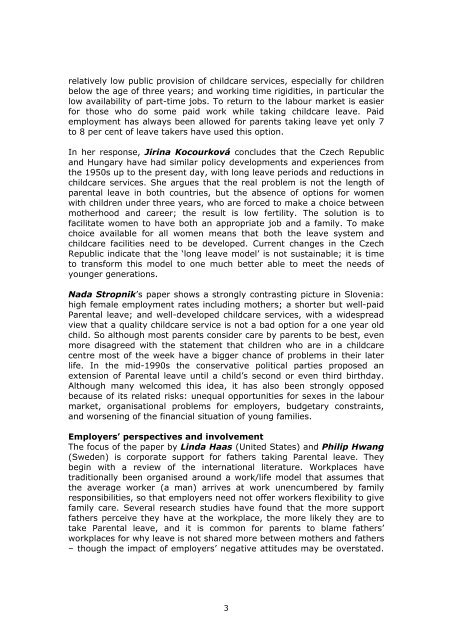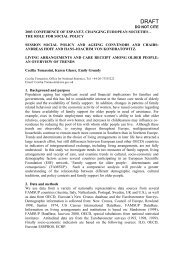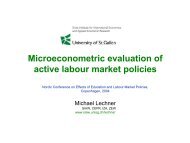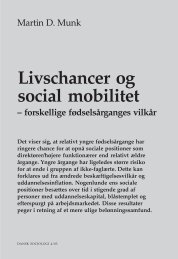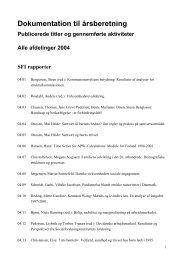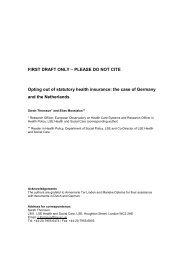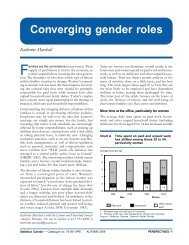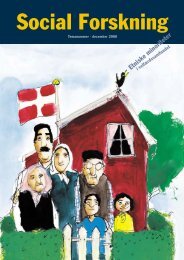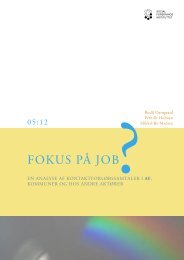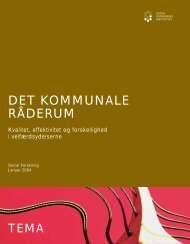- Page 1 and 2: EMPLOYMENT RELATIONS RESEARCH SERIE
- Page 3 and 4: About EMAR Employment Market Analys
- Page 5 and 6: 2.9 Finland .......................
- Page 7 and 8: Career break Leave generally open t
- Page 9: The three-year leave period: too lo
- Page 13 and 14: Germany, Ireland, Italy, Poland, S.
- Page 15 and 16: leave - Czech Republic, Hungary, Ir
- Page 17 and 18: Information on take-up among differ
- Page 19 and 20: Today, the network has 40 members f
- Page 21 and 22: Section 1: Articles 14
- Page 23 and 24: • Óvoda (kindergartens for child
- Page 25 and 26: are of the view that a wife would r
- Page 27 and 28: Table 1.1.1a: Poverty-related stati
- Page 29 and 30: 1.1.2 Hungary: mother’s role - em
- Page 31 and 32: for the first time in 1974. 3 Then,
- Page 33 and 34: Figure 1.1.2a: Positive response to
- Page 35 and 36: Figure 1.1.2c: Positive response to
- Page 37 and 38: 1.1.3 Hungary: possibilities of and
- Page 39 and 40: eported their previous employer wou
- Page 41 and 42: 1.1.4 The Czech Republic: discussan
- Page 43 and 44: facilities. After one or two years
- Page 45 and 46: In 2003, 85 per cent of women aged
- Page 47 and 48: Parental leave was taken by less th
- Page 49 and 50: childcare centre most of the week h
- Page 51 and 52: 1.2.1 Making Fatherhood Visible at
- Page 53 and 54: unencumbered by family responsibili
- Page 55 and 56: fathers, agrees: ‘There is no nee
- Page 57 and 58: usiness climate. We also investigat
- Page 59 and 60: We also looked at the associations
- Page 61 and 62:
white-collar co-workers were report
- Page 63 and 64:
share of the workforce and women’
- Page 65 and 66:
would predict that companies would
- Page 67 and 68:
Kvande, E. (2008) ‘Embodying male
- Page 69 and 70:
Table 1.2.1b: Correlates of Corpora
- Page 71 and 72:
The work-family issue and organisat
- Page 73 and 74:
seriously ill relatives, as well as
- Page 75 and 76:
We created a new variable that tota
- Page 77 and 78:
could take parental leave. However,
- Page 79 and 80:
Haas, L., Allard, K. and Hwang, P.
- Page 81 and 82:
Table 1.2.2a: Number of women and m
- Page 83 and 84:
Table 1.2.2c: Number of organisatio
- Page 85 and 86:
Table 1.2.2g: Four classes of organ
- Page 87 and 88:
more positive incentives, additiona
- Page 89 and 90:
• five have between 2 and 6 weeks
- Page 91 and 92:
Without this broad approach, with a
- Page 93 and 94:
The promise it held The reason for
- Page 95 and 96:
this being that fathers want to enj
- Page 97 and 98:
Jónsdóttir, B. (2007) Upplifun fo
- Page 99 and 100:
2.1 Introduction to country notes P
- Page 101 and 102:
areas. In most countries, leave pol
- Page 103 and 104:
For most EU member states included
- Page 105 and 106:
and Slovenia) and Germany; in addit
- Page 107 and 108:
Paternity leave Like Maternity leav
- Page 109 and 110:
latter camp are the Czech Republic,
- Page 111 and 112:
agreement negotiated at sectoral or
- Page 113 and 114:
In these three Nordic countries, th
- Page 115 and 116:
system. In October 2007 the Ministe
- Page 117 and 118:
few parents take leave schemes that
- Page 119 and 120:
possibility after leave. German dat
- Page 121 and 122:
Table 2.1.1: Provision of statutory
- Page 123 and 124:
Sweden: 480 days of paid leave per
- Page 125 and 126:
Reduced hours in first year: mainly
- Page 127 and 128:
are regulated by public authorities
- Page 129 and 130:
NB Australia is a federal state 1.
- Page 131 and 132:
c. Parental leave Note: As discusse
- Page 133 and 134:
d. Statutory childcare leave or car
- Page 135 and 136:
for in the AIRC’s decision earlie
- Page 137 and 138:
http://www.aifs.gov.au/growingup/,
- Page 139 and 140:
Special issue of the journal Law in
- Page 141 and 142:
2.3 Austria Christiane Rille-Pfeiff
- Page 143 and 144:
c. Parental leave (Elternkarenz) (r
- Page 145 and 146:
After five years of experience with
- Page 147 and 148:
from July 2002 until the end of 200
- Page 149 and 150:
2.4 Belgium Laura Merla and Fred De
- Page 151 and 152:
c. Parental leave (Ouderschapsverlo
- Page 153 and 154:
In April 2007, the federal governme
- Page 155 and 156:
factors and variables that influenc
- Page 157 and 158:
This dissertation analyses the inte
- Page 159 and 160:
Vandeweyer, J. and Glorieux, I. (20
- Page 161 and 162:
1. Current leave and other employme
- Page 163 and 164:
Variation in leave due to child or
- Page 165 and 166:
e. Other employment-related measure
- Page 167 and 168:
Plan. Employers and employees of co
- Page 169 and 170:
support for childcare and for elder
- Page 171 and 172:
of various types of leave, mainly p
- Page 173 and 174:
Flexibility in use • None except
- Page 175 and 176:
The current right-wing government,
- Page 177 and 178:
Professional self-fulfilment causes
- Page 179 and 180:
literally childbirth leave, because
- Page 181 and 182:
• From 2007, the industrial secto
- Page 183 and 184:
It seems that the take-up of leave
- Page 185 and 186:
2.8 Estonia Katre Pall Population (
- Page 187 and 188:
• Parental benefit (vanemahüviti
- Page 189 and 190:
. Selected publications from Januar
- Page 191 and 192:
2.9 Finland Minna Salmi, Johanna La
- Page 193 and 194:
. Paternity leave (isyysvapaa/fader
- Page 195 and 196:
Flexible working • Parents can wo
- Page 197 and 198:
three smaller ones suggested length
- Page 199 and 200:
services. The plan aroused criticis
- Page 201 and 202:
their child turns three, 40 periods
- Page 203 and 204:
The report examines the use of fami
- Page 205 and 206:
for their take-up of leave, their c
- Page 207 and 208:
2.10 France Jeanne Fagnani and Dani
- Page 209 and 210:
Flexibility in use • Parents taki
- Page 211 and 212:
etween 1994 and 1997 about 110,000
- Page 213 and 214:
Chauffaut, D., Minonzio, J., Nicola
- Page 215 and 216:
Flexibility in use • None. Women
- Page 217 and 218:
2. Changes in leave policy since 20
- Page 219 and 220:
The 2007 parental leave reform had
- Page 221 and 222:
Schönberg, U. and Ludsteck, J. (20
- Page 223 and 224:
ii) on leave arrangements for publi
- Page 225 and 226:
the employer’s agreement this may
- Page 227 and 228:
mental handicap or Down Syndrome: u
- Page 229 and 230:
to the minimum daily wage agreed in
- Page 231 and 232:
Research Centre for Gender Equality
- Page 233 and 234:
a. Maternity leave (szulesi szabads
- Page 235 and 236:
d. Childcare leave or career breaks
- Page 237 and 238:
. Selected publications from Januar
- Page 239 and 240:
Glass, C. and Fodor, E. (2007) ’F
- Page 241 and 242:
efer to women’s absence from the
- Page 243 and 244:
Flexible working • Employers are
- Page 245 and 246:
Pétursdóttir, G. M. (2005) ‘‘
- Page 247 and 248:
Gíslason, I. V. (2007)’ Maskulin
- Page 249 and 250:
Flexibility in use • None except
- Page 251 and 252:
2. Changes in leave policy since 20
- Page 253 and 254:
equest flexible working - although
- Page 255 and 256:
Fine-Davis, M. (2007) Childcare in
- Page 257 and 258:
2.16 Italy Dino Giovannini Populati
- Page 259 and 260:
maximum of six months; or shorter l
- Page 261 and 262:
The book reports a study carried ou
- Page 263 and 264:
2.17 The Netherlands Hanne Groenend
- Page 265 and 266:
Payment • For participants in the
- Page 267 and 268:
This savings scheme offers employee
- Page 269 and 270:
women); and d) workers in the publi
- Page 271 and 272:
The research carried out by Statist
- Page 273 and 274:
4. Research and publications on lea
- Page 275 and 276:
shows that labour force exits have
- Page 277 and 278:
2.18 Norway Berit Brandth and Elin
- Page 279 and 280:
Variation in leave due to child or
- Page 281 and 282:
child is 18 years old. Leave is pai
- Page 283 and 284:
A central question in this edited v
- Page 285 and 286:
2.19 Poland Irena E. Kotowska and P
- Page 287 and 288:
• Parents can take leave in one c
- Page 289 and 290:
There is no information on the numb
- Page 291 and 292:
to EU policy. Labour market develop
- Page 293 and 294:
finally, the role of social service
- Page 295 and 296:
Kotowska I. E., Słotwińska-Rosła
- Page 297 and 298:
environment] (2007-2009). Dorota G
- Page 299 and 300:
• Women (or men) can take 120 cal
- Page 301 and 302:
e. Other employment-related measure
- Page 303 and 304:
children). Policy aims regarding th
- Page 305 and 306:
Wall, K. and Amâncio, L. (2007) Fa
- Page 307 and 308:
2.21 Slovenia Nada Stropnik Populat
- Page 309 and 310:
length of the leave is equal to 70
- Page 311 and 312:
Since 2005, eligibility for payment
- Page 313 and 314:
Rener, T., Švab, A., Žakelj, T. a
- Page 315 and 316:
2.22 South Africa Lisa Dancaster, T
- Page 317 and 318:
enefits from UIF. There is, however
- Page 319 and 320:
that the Determination specifically
- Page 321 and 322:
enefits are discussed in the light
- Page 323 and 324:
2.23 Spain Anna Escobedo Population
- Page 325 and 326:
. Paternity leave (permiso de pater
- Page 327 and 328:
d. Childcare leave or career breaks
- Page 329 and 330:
In 2007, a reform of leave arrangem
- Page 331 and 332:
• Though fathers have a new oppor
- Page 333 and 334:
available) when it was 31 per cent,
- Page 335 and 336:
4. Selected publications from Janua
- Page 337 and 338:
familiares en España y en la Unió
- Page 339 and 340:
funded by FIPROS (Spanish Research
- Page 341 and 342:
. Paternity leave (pappadagar) (res
- Page 343 and 344:
d. Childcare leave or career breaks
- Page 345 and 346:
their child reaches the age of two,
- Page 347 and 348:
Försäkringskassan (2005) Vägen u
- Page 349 and 350:
authors found a positive effect of
- Page 351 and 352:
Haas, L. and Hwang, P. (2007) ‘Ge
- Page 353 and 354:
2.25 United Kingdom Margaret O’Br
- Page 355 and 356:
Variation in leave due to child or
- Page 357 and 358:
2. Changes in leave policy since 20
- Page 359 and 360:
Additionally, in 56 per cent of wor
- Page 361 and 362:
The Workplace Employment Relations
- Page 363 and 364:
2.26 United States Sheila B. Kamerm
- Page 365 and 366:
2. Changes in leave policy since 20
- Page 367 and 368:
Tanaka, S. (2005) ‘Parental leave
- Page 369 and 370:
Annex 1 A formal network of experts
- Page 371 and 372:
Annex 2 Network members at April 20
- Page 373 and 374:
Senior Research Fellow, CNRS MATISS
- Page 375 and 376:
Sweden Anders Chronholm, Senior Lec
- Page 377 and 378:
Annex 3 The BERR Employment Relatio
- Page 379 and 380:
No. 26 The content of new voluntary
- Page 381 and 382:
No. 63 The First Fair Treatment at
- Page 383:
Department for Business, Enterprise


